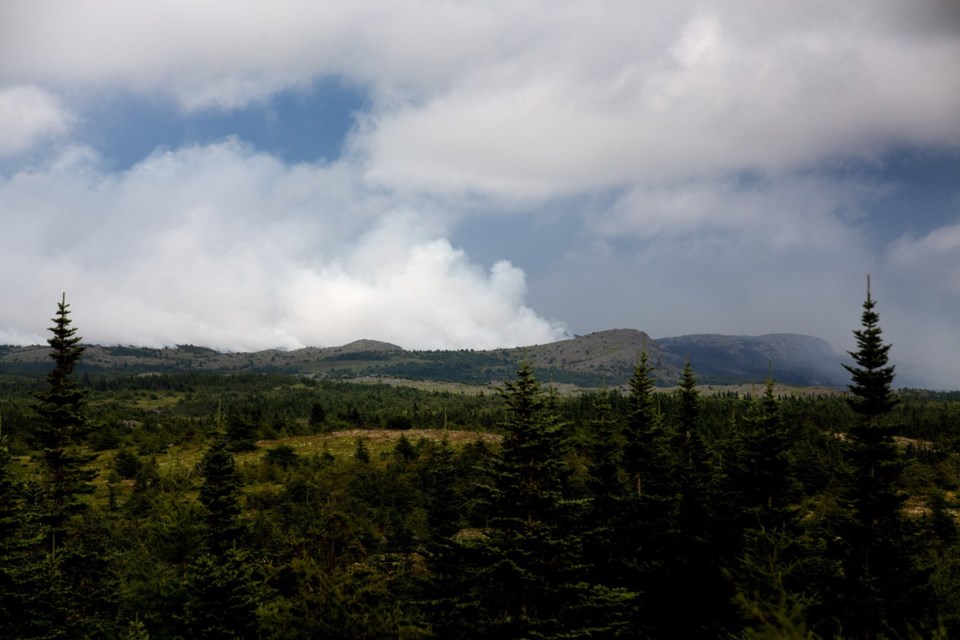Nova Scotia Premier Tim Houston says the weather is not co-operating in his province's fight against a major wildfire burning out of control in the Annapolis Valley.
"Unfortunately, the weather this weekend was not in our favour. The dry conditions continued. The heat continued. The wind was blowing the wrong way. All terrible news when you're facing a fire," Houston told reporters on Monday.
Of the six wildfires burning across the province, the Long Lake fire in Annapolis County was causing the most trouble.
"It feels like every time I receive an update, the fire has doubled again in size," the premier said.
Triggered by lightning, the wildfire has grown to more than 32 square kilometres, officials said. Earlier in the day, they had estimated the fire was 20 square kilometres, but improved visibility in the afternoon permitted officials to get a more precise measurement.
The blaze has destroyed a few campers and trailers, but there have been no reports of damaged homes.
Officials declared a state of emergency in Annapolis County on Saturday. About 100 homes were evacuated in the heavily wooded West Dalhousie area, about 125 kilometres west of Halifax.
Fire crews on the ground include 93 Department of Natural Resources firefighters, 15 local firefighters, 22 from Ontario and five from Prince Edward Island. Four planes from the Northwest Territories and two contracted helicopters are also battling the fire.
Jim Rudderham, director of fleet and forest protection, said Sunday's weather was "horrible for firefighting, although it got better in the evening as the temperature dropped."
Drought-like conditions are causing the fire to spread rapidly, he said. "It's creating its own … heat and moving so quickly, it just keeps kind of rolling along."
The dry conditions are making it more difficult to draw water from lakes as the levels are low, he added.
The town of Annapolis Royal, about 25 kilometres away from the Long Lake fire, should not expect rain until Friday, when there is a 30 per cent chance of showers, Environment Canada says.
Meanwhile, the Newfoundland and Labrador government were expected to tell more people Monday that their homes had been destroyed by a wildfire along the northeastern shore of Conception Bay. The fire began two weeks ago near Kingston, N.L., and officials have so far confirmed that 98 structures connected to power meters have been lost, Premier John Hogan told reporters.
The fire is still burning out of control and damage assessments are ongoing, he said. Thousands remain evacuated.
The Kingston fire in eastern Newfoundland encompassed about 98 square kilometres on Monday — nearly the size of the city of Paris.
In New Brunswick, wildfires have ground the province’s forestry sector to a halt. Some mills are on the verge of running out of wood after the government banned forest harvesting amid extreme wildfire risk, officials said Monday.
A bit of rain fell in the past few days, but it wasn’t enough to relieve the tinder-like conditions of the forest floor, John Herron, the province's natural resources minister said.
“By no means are we in a position for us to be able to reopen the forest carte blanche at this point in time, but we may have opportunities for us to do things on a regional or an area-specific basis,” Herron told reporters in Fredericton.
About 25 square kilometres of forested land have burned or are expected to burn so far — representing a ballpark figure of about $10.5 million in direct and indirect taxes from the forestry industry and about $42.5 million in lumber revenue to sawmills, Herron said.
There were at least 35 fires burning across New Brunswick Monday, six of which were considered out of control. Firefighters managed to get the largest fire, north of Miramichi, contained earlier that morning, Herron said.
“If we had two to five days of sustained rain, something similar to what we saw yesterday, that could be immensely helpful,” he said.
This report by The Canadian Press was first published Aug. 18, 2025.
— With files from Sarah Smellie in St. John's, and Hina Alam in Fredericton.
The Canadian Press




